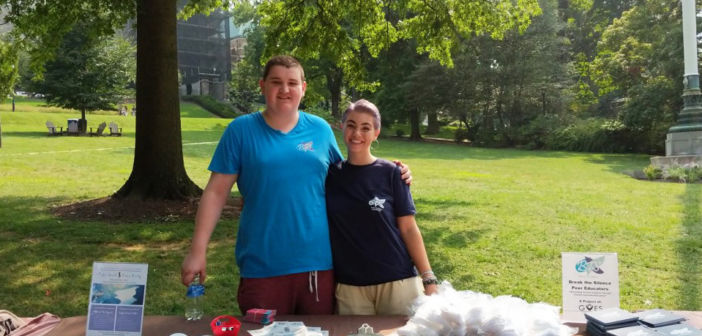Classes don’t start until Monday, but Tom Golden, ’18, ‘20G, plays professor as he shows slides to a room of 35 first-year students.
He’s leading a 90-minute sexual misconduct and education training, the first of four sessions he will facilitate during first-year orientation on a Saturday in late August.
Golden is the graduate assistant for Break the Silence, an organization housed in Lehigh’s Office of Gender Violence Education and Support, which aims to provide students resources and healthy sexual education. Before he took the graduate assistant position, Golden belonged to the group as an undergraduate.
Golden can’t remember exactly why he joined Break the Silence, but he does remember the burlesque troupe that came to campus for part of the organization’s Five Senses of Consent event. He remembers the sex toys explored in the group’s “Sex Toys and BDSM” programming. He remembers watching Break the Silence modernize its presentations to become more inclusive.
Now, as a graduate assistant, he offers guidance as Break the Silence undergraduates take charge of the programming plans.
Break the Silence doesn’t have an executive board — leadership flows through a committee-based, fountain model, in which some people will execute specific projects and events and the rest of the group pools its support.
Brooke DeSipio, Break the Silence’s adviser and the director of Gender Violence Education and Support, said the model allows members to take a step back if they need to while still participating in the organization.
“I can’t imagine not having a peer support group on campus,” DeSipio said. “I think a lot of students would not get the help they need.”
She said Break the Silence members are trained on sexual misconduct resources and reporting options because their peers will often come to them for help. Break the Silence members are mandated reporters, so they are not a confidential resource.
DeSipio said students are more likely to tell a friend — or Break the Silence member — about their experiences than they are to tell a faculty member, staff member or official reporting option.
Caralyn Roeper, ‘21, believes she receives more questions about sexual education and misconduct than she would if she weren’t involved in Break the Silence.
She also said a few students called her this summer to ask for her help.
“(I was called about) what’s going on with a relationship, or like, ‘This just happened to one of my friends who is at Lehigh over the summer,’ which is really cool that you become a resource for people,” she said.
Roeper stressed how important it is for students to have a space on campus to talk about sexual assault, relationship abuse and sex education issues.
Sometimes, however, Break the Silence members have to initiate the conversation.
DeSipio said it takes a lot of self-awareness, self-reflection and identity development to be able to lead discussions on campus.
“It’s not easy to spend your time talking about sexual assault and relationship abuse and sex on campus,” she said.
Break the Silence members can succeed by playing their cards correctly. And one of their cards says “pornography.”
Wascar Ramirez, ‘20, said first-year students shuffle across the Maginnes Hall rooms during orientation to arrange cards with different potentially toxic behaviors onto the “Continuum of Harm.” They must decide if behaviors are “really bad,” “kind of bad” or “not so bad,” and then the group discusses the decisions.
Ramirez, who is now in his fifth year as a member of Break the Silence, said many of the cards are written ambiguously to prompt better discussion.
“(Pornography), on one hand, can be good because of self release, masturbation,” Ramirez said. “But on the other hand, a lot of mainstream porn doesn’t show any consent, so it has all of those downstream negative effects.”
Though Break the Silence can achieve transparency with students with its programming and education, Roeper said sometimes the university isn’t as transparent with students. Because it is a business, it could potentially hurt Lehigh to release negative information about its students, faculty and staff, but Roeper thinks sharing reports of sexual harassment and assault doesn’t reflect poorly on the university.
Sexual assault is a national issue, so Roeper thinks instances of sexual misconduct reveal more about the larger culture that’s been created rather than individual institutions.
“Sometimes it’s definitely discouraging being here and being a member of this organization as a part of Lehigh,” she said, “But it’s also reassuring that since our program started, we’ve made a lot of progress.”
Break the Silence has made progress beyond the perimeters of Lehigh’s campus. Roeper said members advised Moravian College students in developing and running a program similar to Lehigh’s, because the college didn’t have one in place.
Golden said the group has improved its education and outreach. And student reception has improved as a result.
He said this is the first year that a lot of Break the Silence members have had first-year students they trained during orientation approach them days and weeks after the session to chat and thank them.
“I had one of my students (from orientation) say to me, ‘I had sex this weekend and I used consent like you said,’ and she gave me a fist bump,” Golden said. “And that, like, never happened before.”






Comment policy
Comments posted to The Brown and White website are reviewed by a moderator before being approved. Incendiary speech or harassing language, including comments targeted at individuals, may be deemed unacceptable and not published. Spam and other soliciting will also be declined.
The Brown and White also reserves the right to not publish entirely anonymous comments.
3 Comments
“I can’t imagine not having a peer support group on campus,” DeSipio said. “I think a lot of students would not get the help they need.” Wouldn’t it be more efficient to teach people respect, compassion and responsibility than to have a peer support group for every group of people on campus. This of course would not address personal desires of individuals.
Teaching attitudes that can be agreed upon will alleviate the differences that groups have with each other over attributes that define each group. The desired attitudes will never be attained but can be identified as goals. More groups, more differences; acceptance seems like a weak solution and as a current advertisement states: ” okay is not okay” https://commercialsociety.wordpress.com/2019/01/03/att-says-just-ok-is-not-ok/
Robert, you make a good point. In case you aren’t aware, Lehigh is already instilling these values by promoting the “Principles of Our Equitable Community,” which are posted in every academic building, included in every course syllabus, and taught to students throughout their time at Lehigh. I agree that it is a good starting point. However, the issue of sexual assault on campus seems to be more complicated than this. While teaching about sex is fun and enlightening for students, its purpose is to raise awareness of what healthy/ consensual sexual practices look like in order to prevent sexual assault. I am a member of Break the Silence, and our support does not solely include facilitating presentations and talking to friends. Like all other members, I completed over 40 hours of training pertaining to laws, policies, and procedures involved in the reporting and investigation of sexual assaults and relationship violence on campus. An important portion of our support deals with teaching those in upsetting situations what resources they have available to them, which types of action they are able to take, and what laws they should be aware of in order to make the most informed decisions about their lives after experiencing trauma. I believe that these functions of the group are important and valuable to Lehigh’s students: especially those who need the help most.
Krista, you write: “I believe that these functions of the group are important and valuable to Lehigh’s students: especially those who need the help most.”
Opprtunist: 1. A person who dexterously and expediently changes or adopts opinions.
e.g. Ever the opportunist, she immediately set about becoming the incoming administrator’s new best friend
Synonyms of opportunist
acrobat, chameleon, chancer [British], temporizer, timeserver, trimmer, weathercock
Words Related to opportunist
egoist, egotist, self-seeker
conniver, machinator, plotter, schemer
2. One who does things only for his own benefit and with little regard for right and wrong
an opportunist who makes friends and then drops them as soon as they aren’t useful anymore.
Ponder our President. The argument should be considered that the ones who need help most are not the victims but the perpetrators (to be truthful all of us have the ability to be perps in some instances as condition of being human). How do we get the “Principles” off the posters and into the hearts? Break the Silence is a very useful band-aid, controlling the “perp” in us is a root solution not a start.